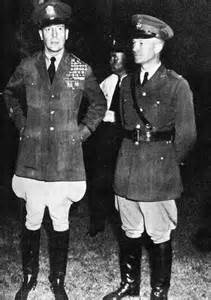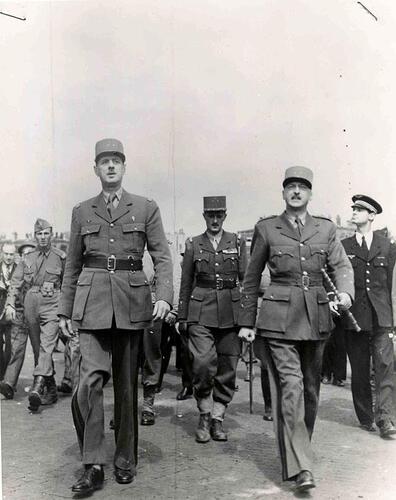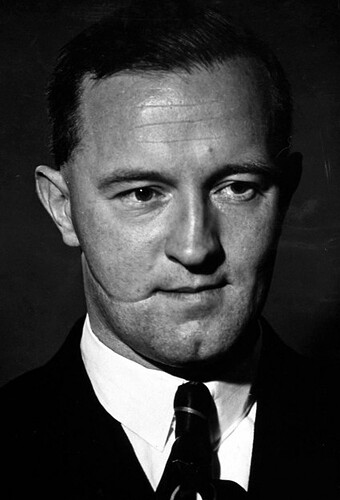This person could be a politician or general, or anyone with any significance for that matter. I’m going to cast my vote for Charles de Gaulle. I will give him credit for probably being the one most responsible for saving France by going to Britain in 1940 and rallying the French people, and by keeping French interests prominent with the Allied High Command at the strategy table. But he was not a likable personality. He was stubborn and inflexible, and he refused to place himself in a second tier position when he was fortunate to even be at the same table with FDR, Churchill, and the other great generals of the time. What is your opinion? Was it Rommel, Bradley, MacArthur, Monty, or someone else?
General Douglas Macarthur hands down! He should have been court-martialed for his failure on December 8th, and he was lucky he got the order to leave the Philippines from FDR. It was downright shameful that he refused to concur to give General Wainwright the Medal of Honor, and his strutting about as dictator of Japan was despicable. While his Inchon plan was ingenious, he finally got what he deserved at the hands of President Truman who dismissed him for insubordination during the Korean War.
I’m not a Mac fan either, but I think he handled the Japanese occupation rather well if imperfectly…
Though he was not in strict terms military, he was an overrated Personality,(Aside from being Britain’s leading Traitor) so i’ll put up William Joyce, known to the Allies as “Lord Haw Haw” Male counterpart of Axis Sally. From his image, it looks like someone had set about giving him a “Glasgow smile”
I agree. His handling of the Japanese Occupation was probably his best accomplishment. I’m not too wild about anything else he did.
I like your choice.
Any of those propaganda meisters were simply laughed at by the troops. They were a waste of time and money, though I heard they played good music.
There was probably a chance they demoralized some, especially Axis Sally with her “What’s your wife doing tonight?” sorts of taunts. But there is no question they also entertained Allied troops with the music and probably did them more good than harm…
Well, the music, and the folksy talking to the neighbor sort of way they worked was intended to insinuate at a subtle level, the impressions the Axis desired to implant. Somewhat like hypnosis, music causes people to drift off a bit, get comfortable, and the little, subtle bits of propaganda seep into the subconscious. It’s not always the coarser, overt nonsense that is intended to be absorbed by the listener, but could leave an impression if the listener was in the correct frame of mind. Tone,and cadence of the speaker was also meant to assist in the process, and assuring trustable voice helps the BS go down. Think of Morgan Freeman doing such work, people love his voice, and will genuinely listen to him no matter what he might say. All very tricky stuff, and it does work after a fashion.
William Joyce - an odd fish. Born in New York of an Irish father, he spent much of his childhood/adolescence in Ireland (Free State), later going to the UK and obtaining a UK passport. In spite of his somewhat disrupted education, he obtained a First Class Honours from the University of London. By that time, he had moved into the fringes of the British extreme Right. He obtained the notable scar in less-than-Heidelberg fashion in a brawl with Left-wing enemies attempting to disrupt a political meeting called by a right-wing Conservative politician in the early-1920s, at which time he was loosely associated with a number of far-Right movements, including the Conservative right and the British Fascisti. Even early on, he was noted as a powerful orator and an extreme (British) Nationalist and anti-Semite.
His curious combination of orator and thug was repeated in his association with the British Union of Fascists in the 1930s. He subsequently decamped to Germany in fear of being detained at the behest of the British security services, and more-or-less stumbled into propaganda broadcasting, eventually taking the star role as a propaganda broadcaster on the German radio service’s English language “services”. Whether his diatribes were effective as used against the Britishis debatable. Exposed to this sort of verbal propaganda, it seems to me that most Brits are more inclined to stiffen their lips, laughing at the same time, rather than falling into panic.
His eventual fate has a certain horrible interest from a legal point. There were a number of aspects of his complicated nationality (US, Irish, UK, German from 1940) that might have been pleaded in his defence in his trial for High Treason. The one chosen, however, was a technical defence to the effect that the fact that he held a British passport did not in itself imply eligibility for protection by the British consular service when abroad, in particular, when his assumption of German citizenship in 1940 constituted a renunciation of British legal nationality. The British Director of Public Prosecutions argued, in reply, that the fact that his last renewal of his British passport, still valid for at least a part of his time as “Lord Haw-Haw”, exposed him to the rights and obligations of a British citizen, even if he was located abroad and had taken out citizenship of his host country - another technical, and somewhat dubious proposition. The fact that his legal entitlement to a British passport in the first place (he had claimed in applying for his original UK passport that he was British-born, a patent untruth) does not seem to have been regarded as significant. Joyce was convicted of High Treason, and his appeal was rejected by the higher courts. He was consequently sentenced to death and hanged. Perhaps he should have attempted the defence of US - or even Irish - citizenship. However, these options, no doubt, were ruled out by his ideological stances.
As an influence on the war, well, it seems to me that he was mainly a source of amusement to his British listeners. If anything, his broadcasts would appear to have been counterproductive from a German viewpoint. Yours from the Rundfunk Bunker, JR.
Perhaps, but by which country?
Leaving aside the technical status of the Philippines at the time as effectively an American possession on the way to independence around 1946, was MacArthur a greater disgrace to the Philippines, which employed him at great cost to defend it (and from which he departed with a lot of loot) or to the US, to which he reverted as a commander shortly before the war?
I’d argue that he failed the Philippines the most by failing to live up to his assurances that he had prepared it well to defend itself in the years leading up to the war, and failed the US not much less by his equally confident but baseless assurances to the same effect in the immediate pre-war period. That makes him perhaps the only Allied, or any, commander of a nation to fail completely both nations he served and assured he could defend successfully in the lead up to WWII, and to lose one of them to the enemy, solely by his own spectacular hubris and incompetence.
Conversely, once he had overcome his failure and the panic that his undeserved career was over, and engaged in his usual machinations to conceal his incompetence in the early phases of the SWPA 1942-43, he grew into the role of a theatre commander and did reasonably well as he gained masssive logistical and other support and notably directly and indirectly from the USN throughout his campaigns and especially from the Australian land forces which with his boundless and unreasoning contempt fought most of his land war in 1942-43. His greatest achievement was, however, creating and expanding a massively successful personal propaganda machine run by a sorry bunch of senior “yes men” who persuaded the public and many in US and Australian government that MacArthur was the greatest military genius in the history of the world and the sole repository of Western knowledge about Japan and its Emperor, presumably gained from close association with the unrelated people, cultures and government of the Philippines.
MacArthur was in historical terms undoubtedly “a great man” of his time but, viewed against his many “great man” contemporaries, he was as a commander and especially a civilian political aspirant to the US Presidency eventually gained by Eisenhower, whom he described as “the best clerk I ever had”, just an “also ran”. This is amply demonstrated by his failed and ham-fisted 1944 tilt at the Presidency, which is outstanding for the obsequiousness of his attempts to curry favour with people he thought might help him win office.
Outstanding candidate for the most overrated, especially given the mythology surrounding the supposed Desert Fox, is Rommel.
Panicked and stopped in the approach to Dunkirk.
Lost in North Africa.
Lost on the Western Front.
Committed suicide.
Subsequently admired by many, who obviously know nothing about his achievements or lack of them, as a military genius.
Yes, a strong case for Rommel, in spite of the “legend”. Rommel’s conduct in the first phase of the Battle of France was, when you look at it, extraordinarily reckless. Some of his professional colleagues thought he was mad. Perhaps not mad - but his command of the 7th Panzer was in many ways better suited to a company, rather than a divisional commander. One might ask why, since his deficiencies as a senior commander were recognized by so many of his fellow generals ? Why did they not transfer him to less sensitive commands, rather than more ?
The answer, almost certainly, lay in his personal connections with the senior Nazi leadership - something seldom if ever mentioned in the construction of his postwar “legend”. Rommel had the good fortune, in the immediate prewar period and extending through the Polish campaign, to be placed in command of the Fuhrer’s personal Army escort/bodyguard. This placed him in close official and social connection with Hitler and the top level of Nazi politicians. As a First World War hero (EK I, Pour le Merité) he clearly impressed Hitler and others of his coterie with whom he developed cordial relations (at the very least). He particularly impressed Joseph Goebbels, who became his political patron and friend. (Prior to the Western campaign he presented a Leica camera to Rommel, which the latter used to document the campaign in photos). Combined with his talent for self-publicity, these political connections served Rommel well in promoting and protecting his career. For example, his appointment to the command of 7th Panzer Division was less than obvious, given his well-deserved reputation as an infantry tactician and general lack of interest in mechanized warfare in the prewar period. While the process remains somewhat obscure, his appointment to this command definitely owed much to the favouor in which he stood with Hitler and Goebbels. Postwar, members of his immediate family expressed the belief that, without his political influence, he would have been appointed to a Mountain Division rather than high-profile, better-than-average Panzer Division.
And so it went on. Rommel retained the confidence of Hitler and Goebbels right up to the July Plot in 1944 (in which, in reality and contrary to the legend, his involvement was marginal at most). There is a possible irony in the fact that his ultimate fall to Hitler’s post-Plot paranoia may have owed something to the failure of his Army colleagues to defend them. The most obvious example was the behavior of Gerd von Runstedt, his former commander in the 1940 Western Campaign and subsequently in the Western command preparing for the Allied invasion of Western Europe. Even to the end, he seems to have retained some credit with his former Nazi friends, as somewhat ambivalent comments in Goebbels’ diary suggest. One might suggest that his previous choices of political means to his career development deprived him of much chance that, when the Devil turned, he might receive sufficient protection from sources that might conceivably have saved him. Also, it calls to mind the admonition of the Earl of Strafford, back in the early 17th century - “Put not your trust in princes”. Yours from the Big Black Block, JR.
By the way … sorry that imi is leaving. All the best to him. But, really, some of his recent posts have been hard to defend, whether on grounds of historical argument or of, I suppose, taste. Best regards, JR.
And much, much harder to understand for those of us accustomed to rational analysis of historical evidence.
In fairness to Rommel, he was a gambler who played for high stakes and, with more luck or different circumstances, might have won.
Rommel in France in 1940 and in North Africa might be compared with the British commander Richard O’Connor who had fortune on his side in some daring and magnificently successful offensives against the many more and better equipped Italians. O’Connor’s actions could easily have ended in failure, notably his daring flying column of armour to cut off the Italians at Beda Fomm which was critical in forcing the Italians to surrender, and ultimately in Rommel being sent to North Africa to try to correct the mess the Italians had created.
On one interpretation, Germany made the classic mistake of reinforcing (Italian) failure by sending Rommel to North Africa where the German military and logistical commitment to that theatre was disproportionately large to the fairly inconsequential strategic benefit to Germany in ejecting the British Commonwealth from North Africa. And more so as Germany’s major strategic aims were to be gained by land assaults north and east of the Mediterranean, none of which would have been significantly improved by holding North Africa or controlling the Mediterranean. It could be said that Rommel was handed a bit of a poisoned chalice in being sent to a strategically less than critical theatre. If one accepts that, it could also be said that Germany didn’t send its best and brightest commander to such a theatre.
Much the same could be said of sending Rommel to command the Western Defence when Germany was flat out fighting in the east.
These interpretations are obviously selectively narrow and simplistic against a much more complicated background, but I put them forward to suggest that it can be argued that Rommel clearly wasn’t Germany’s greatest commander, and his contemporaries above him took that view, because he was never put in command in its most critical theatres.
Like MacArthur, he is a very much better commander in the minds of people whose knowledge of him is derived from popular mythology and propaganda than accurate history.
Very well said. He did do a great job though of clearing Washington D.C. of all those unarmed WWI veterans during their “Bonus March”. What a pompos A$# he was.

Interesting question. Mac would certainly be right up there but I would go with Halsey.
Now you need to ask which Halsey? The inspiring leader of October 42 who provided inspiring leadership in the Solomons or the bungling leader of 1945 in command of the 3rd Fleet.
When He took over 3rd Fleet and Nimitz had him rotating with Spruance in 1944 he hadn’t commanded in a major fleet action in almost 2 years. His tenure in 44-45 was characterized by bungling, very bad staff work, uninformed about carrier operations -that changed, as we all know, drastically between 42 and 44, and once again as we all know he had a knack for running into Typhoons.
I would have sent him home to sit maybe on the General Board and given command of the 3rd Fleet to either Pete Mitscher or John Tower.
Honorable mention to Mark Clark. After the disaster on the Rapido in Feb of 44, and his failure to give proper orders to cut the German 10th Army off in the Alban Hills after the breakout, I would have relieved him of his command.
Welcome to the board, Gsetzer.
Thanks for those well considered and informed comments.
We look forward to more of your contributions.
Rising Sun*
thank you Rising Sun. I just found this forum and already love it. The people who post here are obviously extremely well informed. It’s refreshing to interact with other people this well informed.
Gsetzer


